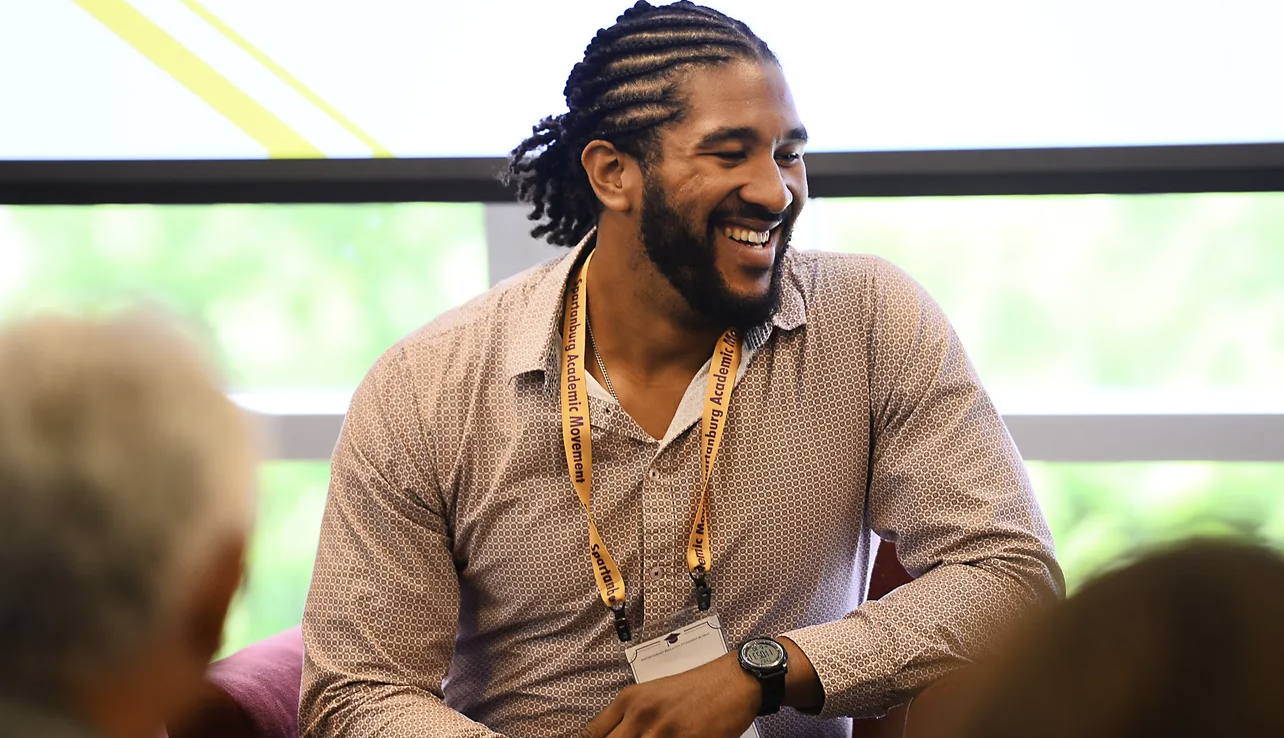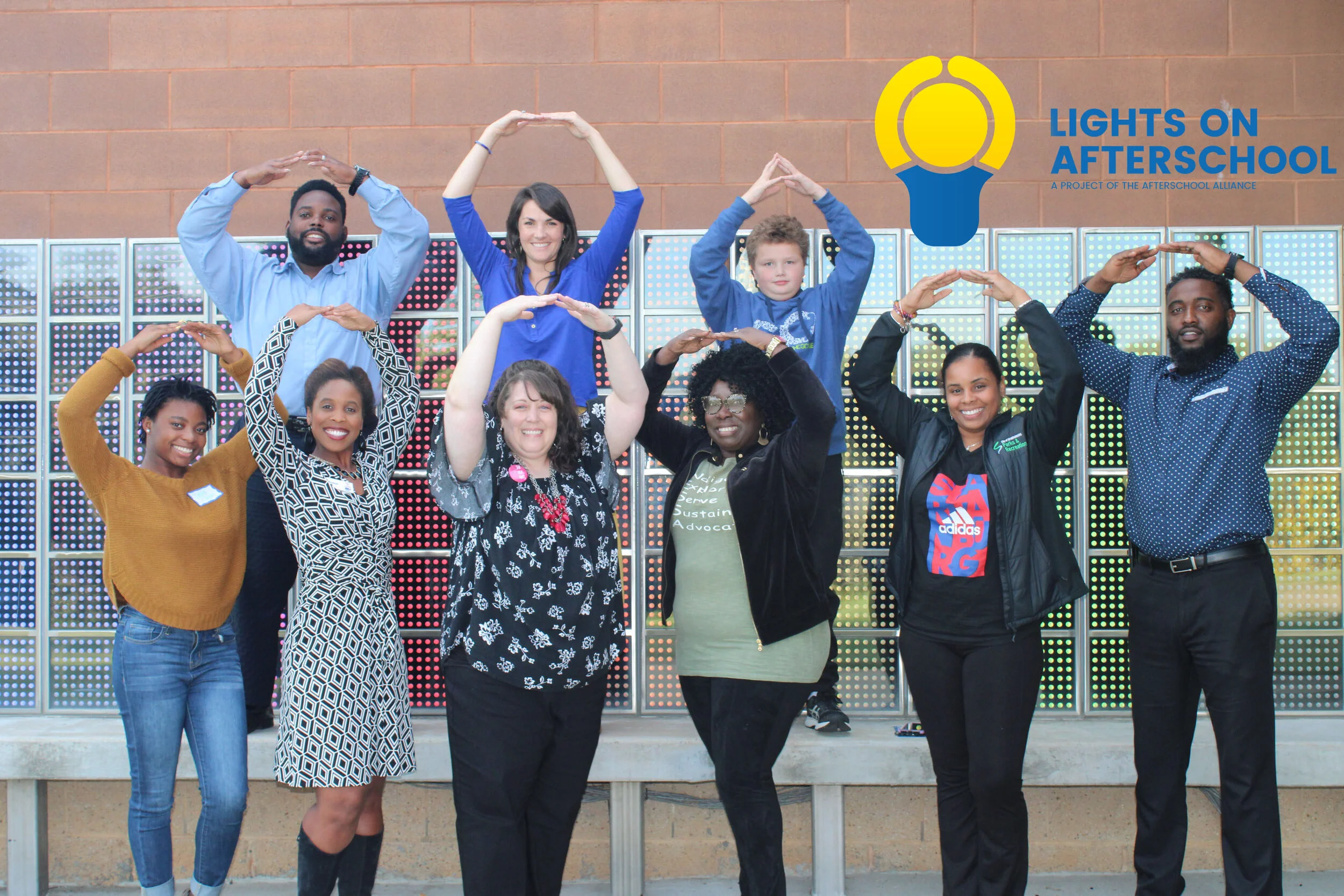Learning is a constant in the lives of children. We are thankful to have this certainty that provides a focus in these uncertain times.
Continuous Improvement Science use spreads from Schools to local Nonprofits
The Spartanburg Academic Movement (SAM) announces the graduation of 9 community leaders from its 2019-2020 Continuous Improvement (CI) for Leadership program, offered through SAM’s training hub, the John T. Wardlaw Institute for Continuous Improvement. On Wednesday, February 20, 2020 participants in the CI for Leadership, designed for leaders of Spartanburg County nonprofit, education, civic, and government agencies completed their 35 hours of training with project presentations.
Members of the 2019-2020 Continuous Improvement Leadership class and training team shared in a project showcase at Spartanburg Community College on Wednesday, February 20, 2020
“The effort to improve impact for the work of community service providers is not a “one-and-done” action. It is definitely a process. With the guided project specific practice built into this training, each leader now has tools that can be used to address many more opportunities for growth. We’re excited to see how they apply these learnings next,” said Mendy Mossbrook, Director of the Wardlaw Institute.
Project specific work woven around 35 hours of in-class training has set multiple education and nonprofit organizations on new paths for building impact across Spartanburg County.
Kitta Cates, executive director of Healthy Smiles directed her project toward capacity building. Without more dentists, more families could not be served. Recruiting volunteer service from more of the 100+ dental professionals in the area became her focus.
Nora Curiel-Munoz explains how her PASOs project reduced the time it takes to deliver services to children when developmental delays have been detected
Three projects were led by staff of the Upstate Family Resource Center(UFRC). Two projects were embedded in the PASOs program that provides culturally-tailored education, support, and resource navigation in order to address health disparities and improve outcomes for Latino mothers and babies in Spartanburg County. The third project focused on the organization’s positive parenting program.
Staff member Amida Thomas sought to improve impact for PASOs outreach efforts, noting the challenge of attending community outreach events that resulted in minimal impact for the Latino mothers they work to serve. Her goal was simple: increase the number of people engaged per hour of outreach. Her detailed process included analyzing how outreach time was spent and where. By completing a FMEA (Failure Mode and Effects) analysis, she found ways to improve the logistics of the events to enable more time to be spent engaging with potential clients. While engagements did not rise to her goal level, they did rise, bringing a new energy to her efforts and many new ideas for improving the work.
Kelley Ezell, executive director for the Upstate Family Resource Center came to the project showcase to support her staff members working to embed CI in UFRC programs. While learning of projects others had undertaking, leaders continued brainstorming solutions to challenges, building stronger networking and resource sharing across agencies.
Lauren Friedrich explains how key drivers and process effectiveness testing during her project are helping to focus the museum’s work to reach underserved community populations.
Lauren Freidrich, director of Spartanburg’s Upstate Children’s Museum, focused on the museum’s effort to serve low income, especially minority, children and families. She analyzed the use of accessibility programs; Museums for All, Finances for Families free memberships, Upstate Play Partners free passes, and Basics Bucks. Action taken during the analysis did not result in increased use. “It might seem like a failure, but we learned so much from this. We kept trying to make the thing that wasn’t working, work. We now know we need to re-evaluate what we’re doing and go back many steps to really look at we can reach communities better. We’ve really internalized this work.” she said as she shared her team’s project.
“That’s my favorite part of what you did. Part of this work is not always about it being successful in terms of meeting the goal you set. It’s about learning from the process and then seeing where you need to make adjustments. I see that as success because it allows you to think about next steps that are different and changing systems for greater impact using the process,” was feedback offered by Cheryl Broadnax, Senior Director of District Improvement for StriveTogether. Broadnax is serving as a consultant and project coach for the Wardlaw Institute’s leadership trainings.
“Our next step is to do a Kaizen workshop. We are already collecting our data for that. We are in the process of mapping our visitor traffic by their residence census tracts,” Freidrich added.
Through the Wardlaw Institute, SAM is now positioned to offer Kaizen workshops, explained Mossbrook. “We’ve brought in improvement specialist Eric Hayler to lead this more specialized level of continuous improvement work with us. It will bring a team together to lead the museum staff through the problem solving process to create their action plan, in this case, to improve reach to low income, minority populations.”
A series of videos about the trainings as well as course descriptions and schedules can be found Wardlaw Institute web pages.
Continuous Improvement (CI) Science Spreads Across County
The recent graduation of 23 educators from leadership training offered through the John T. Wardlaw Institute for Continuous Improvement (CI) shows the growth of CI practice across Spartanburg County’s educational system as part of the Spartanburg Academic Movement’s effort to improve outcomes for children.
Lights-on Shine Brightly
Members of the Out-of-School Time (OST) Collaborative prepare for the roll-out of the OST Action Blueprint for Spartanburg County as part of the County’s first “Lights on Afterschool” event.
In a first-of-its-kind event, Spartanburg community members celebrated an often-overlooked yet vital time of life for a young person: the 5000 + hours they spend outside classrooms. The celebration drew attention to county-wide efforts to make those hours “count,” focusing on the impact of the programs currently bringing high quality out-of-school time programs to youth in grades 6-12.
Lights-On Afterschool Spartanburg was held October 24, 2019 at the CC Woodson Community Center. In attendance were youth service providers and community members interested in learning more about efforts underway to close persistent opportunity gaps by improving, expanding, and sustaining high-quality afterschool and summer programs for middle and high school age youth. The work is being done by the Out of School Time (OST) Collaborative, led by Savannah Ray and Meghan Smith through the Spartanburg Academic Movement.
The OST Collaborative builds upon the work that began with CONNECT, the Adolescent Health Initiative of the Mary Black Foundation, and works to build collaborative action toward collective impact across program providers across Spartanburg County. Following a committed effort to honor a “nothing for us, without us” youth engagement model, the OST Collaborative kicked of the announcement of its Spartanburg County action blueprint in conjunction with the national Lights On Afterschool Campaign. The plan builds upon what youth made clear: “We are asking for support, protection, opportunities, fairness, respect, acceptance and equality. We want youth development opportunities.”
Savion Madison (left) brought the group to a standing ovation as he shared the impact of the My Brother’s Keeper (MBK) program
Impact stories shared by My Brother’s Keeper (MBK) participant Savion Madison brought the crowd gathered to a standing ovation, building energy for expanding efforts to reach all Spartanburg County Youth.
Savannah Ray shared the particular focus being given to youth living in poverty, whose participation in out-of-school time programs had been limited. “After surveying our largest program providers, we found that only 14% of this target population were participating in the activities that are helping to build skills needed for success in life. The goal of the OST Collaborative is to increase that to at least 28% by 2024,” she explained.
Meghan Smith (left) and Savannah Ray (right) lead the OST Collaborative as part of their work with the Spartanburg Academic Movement
The OST effort has recently earned grants from the Mary Black Foundation and America's Promise Alliance to develop the infrastructure needed to align program providers to shared impact goals and quality standards. The grants have provided funding for training through the Child protection Training Center at USC Upstate; ongoing Collaborative work sessions; and consultation support from Ron Fairchild, President and CEO of Smarter Learning Group. Meetings of the Collaborative have continued and are open to participation from other youth service/program providers.
For additional information about OST Collaborative meeting times and actions, contact Savannah Ray or Meghan Smith.












